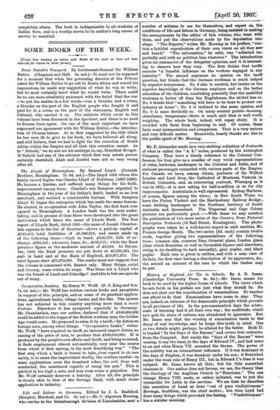History of England for Use in Schools. By A. D.
buses: (Cambridge University Press. es. 6d.)—Mr. bums means his book to be used by the higher forms of schools. The views which he sets forth in his preface are joist what they should be. He does not shut out the consideration of examinations. No teacher MIL afford to do that. Examinations have come to stay. They are, indeed, an outcome of the democratic principle ishieh prevails in all provinces of life. In the pre-examination days the aristo- crats of learning had it all their own way ; the multitude, which. now gets its share of culture, was abandoned to ignorance. But Mr. limes seed that the worship of examination tends to' the decay of real knowledge, and he keeps this truth in mind. One or two details might, perhaps, be altered for the better. Book' is headed "In the Days of the Barons," and covers four centuries from the Conquest. But surely the "days of the Barons" Were' waning, to say the least, in the days of Edward IV., and had come to an end when Henry VII. mounted the throne. The power of the nobility was an intermittent influence. If it was dominant in the days of Stephen, it was decadent under his son ; it flourished under the weak rule of Henry III., but in Edward I.'s time it was eclipsed. Mr. limes knows all this ; but his title somewhat obscures it. Our author does not favour, we see, the theory that the 'theology of the Anglican Chinch is " Ilenrician." The one change Henry VIII. made, or rather initiated, was to tut the vernacular for Latin in the services.' We SOS that he &earthed the execution of Laud as done "out of pure vindictiveness." Revenge, doubtless, was the chief motive ; but then Laud had done many things which provoked the feeling. "Vindictiveness "
has a sinister meaning. '










































 Previous page
Previous page